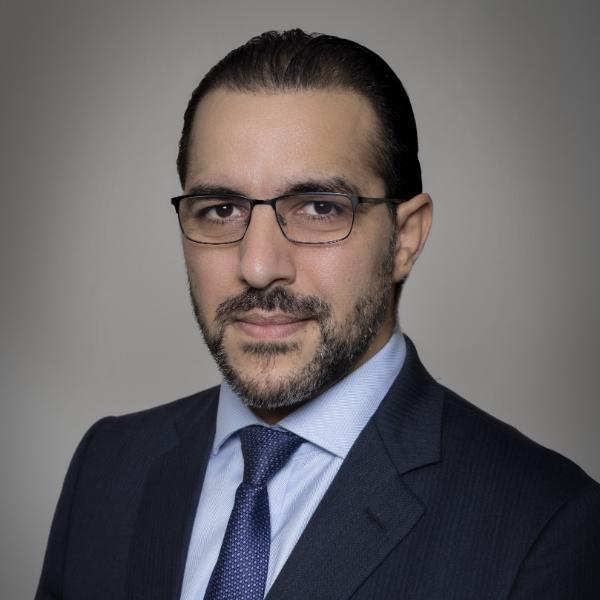
Fawaz Al-Mufti, M.D.

Contact
Al-Mufti, M.D. is a highly accomplished triple-trained, board-certified neurologist, neurointensivist, and neuroendovascular surgeon—standing out among a select few in the country. He joined Westchester Medical Center in 2018 from Rutgers University - Robert Wood Johnson University Hospital, where he served as the director of neuroendovascular surgery (neurology).
Specializing in cutting-edge neuroendovascular techniques for the minimally invasive management of cerebrovascular conditions, Dr. Al-Mufti focuses on treating aneurysms, arteriovenous malformations, dural and cavernous fistulae, spinal conditions, and life-saving acute ischemic stroke.
With an exceptional track record of over 250 peer-reviewed publications, he oversees research at the Westchester Medical Center (WMC) Brain and Spine Institute and serves as the inaugural director of the Center for Neurological Research and Innovation.
As the Director of the CNS Neuroendovascular Surgery Fellowship, Dr. Al-Mufti has mentored over 100 students, residents, and fellows. His contributions extend to representing New York Medical College and the WMC Brain and Spine Institute at national and international cerebrovascular conferences, as well as designing and leading numerous national and international clinical trials. Serving as the principal investigator for multiple major funded multi-site trials, he plays a crucial role in scientific and educational committees of prestigious organizations, such as the American Academy of Neurology, Society of Vascular and Interventional Neurology (SVIN), and the Neurocritical Care Society. Additionally, he chairs the Interventional Neurology Section of the American Academy of Neurology.
In addition to his clinical and academic pursuits, Dr. Al-Mufti takes on leadership roles, serving as the treasurer of SVIN and the global chair of SVIN's Mission Thrombectomy, a non-profit organization advocating for global access to mechanical thrombectomy. Dr. Al-Mufti's commitment to patient outcomes is deeply rooted in his experiences working with Doctors Without Borders in war-torn regions. His dedication is evident in his belief in a collaborative, multidisciplinary approach to patient care, emphasizing patient education and joint decision-making with patients and their families.
"I attribute my dedication to my patients' outcomes largely to my war experiences and my upbringing. A patient must be considered as a person first and foremost – and should be treated as if they were a family member." Dr. Al-Mufti firmly believes in a collaborative multidisciplinary approach to patient care, seeing his role as a combination of physician and educator, with patient education and joint decision-making being paramount.
Education
- Fellowship: Neuroendovascular Surgery, Rutgers University
- Fellowship: Neurocritical Care, Columbia University
- Residency: Neurology, The State University of New York at Stony Brook
- Residency: Chief Resident, Neurology, The State University of New York at Stony Brook
- Medical: M.D., Nahrain University College of Medicine
Areas of Expertise
- Surgical Management of Strokes
- Cerebral Aneurysms
- Cerebrovascular Malformations
- General Neuroscience
Honors and Awards
- 2024: Inducted Sigma Xi Scientific Research Honor Society
- 2023: Inducted Alpha Omega Alpha Medical Honor Society
- 2020: Castle Connolly Top Doctor in New York
- 2019: Marquis Who's Who Top Doctor in Neuroendovascular Surgery
- 2018: Marquis Who’s Who in Medicine
- 2017: Recipient, Cerebrovascular Fellow’s Award, American Academy of Neurological Surgeons
Publications
- Cirillo L, Abdalkader M, Klein P, et. al. "Thrombectomy Selection in the Large Core Era: Implications for Regional Transfers." Current neurology and neuroscience reports, 25(1), (2025) 33. doi: 10.1007/s11910-025-01421-x
- Elfil M, Ghaith HS, Jain A, et. al. "Transradial Access as an Innovative Approach for Endovascular Thrombectomy: A Living Systematic Review and Meta-Analysis." Cardiology in review, (), (2025) . doi: 10.1097/CRD.0000000000000923
- Jain A, Aifuwa E, Bienenstock R, et. al. "Outcomes of Blood Transfusions in Patients Undergoing Mechanical Thrombectomy for Acute Ischemic Stroke: A Population-Based Cross-Sectional Study of 47,835 Patients." Brain sciences, 15(4), (2025) . doi: 10.3390/brainsci15040386
- Elfil M, Ghaith H, Spirollari E, et. al. "Enhancing Outcomes in Subdural Hematoma: The Role of Middle Meningeal Artery Embolization." Cardiology in review, (), (2025) . doi: 10.1097/CRD.0000000000000922
- Medicherla CB, Salem A, Dammavalam V, et. al. "StrokeNet Thrombectomy Endovascular Platform (STEP): A Catalyst for Stroke Research." Cardiology in review, (), (2025) . doi: 10.1097/CRD.0000000000000920
- Jain A, Ng H, Subah G, et. al. "Investigating Outcomes of Pediatric Stroke due to Extracranial Arterial Dissection: A Population-Based Cross-Sectional Study of 11,000 Patients." Cardiology in review, (), (2025) . doi: 10.1097/CRD.0000000000000927
- Ramakrishnan P, Jain A, Spirollari E, et. al. "Innovation in the Management of Delayed Cerebral Ischemia in Subarachnoid Hemorrhage." Cardiology in review, (), (2025) . doi: 10.1097/CRD.0000000000000921

